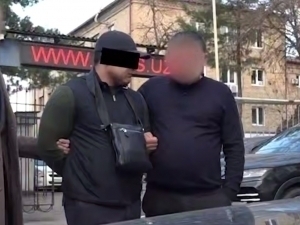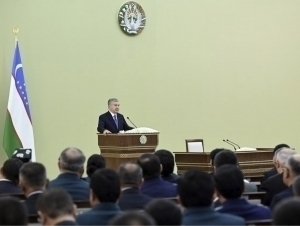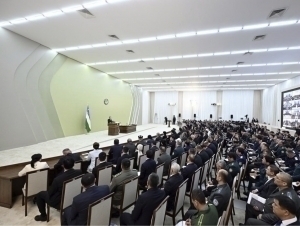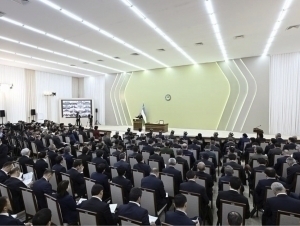Uzbekistan in trouble, taxi drivers are a nuisance, rulers are above the law – analysis of the week
Review
−
14 June 2025 10779 15 minutes
In Russia, humiliating migrants and treating them like animals has become commonplace. It is now routine to ignore their concerns, and even when acknowledged, no real attention is paid, nor are promises kept. We have long grown accustomed to this. Perhaps that is why violence against migrants not only continues but is increasing by the day.
Sherzodkhan Kudratkhodja urges Uzbeks not to go to Russia
A raid conducted by security forces on June 8 at a facility under the Russian Ministry of Defense in Moscow sparked outrage in Tashkent. The first public reaction came from Sherzodkhan Kudratkhodja, Rector of the University of Journalism and Mass Communications of Uzbekistan. He shared a social media post, calling on young people not to travel to Russia.
“I want to tell our youth, boys and girls—don’t go to Russia. They will beat you, kick you, and humiliate you. In Russia, you are not respected. On the contrary, you are trampled on. And yet you do the hardest jobs that even your own people would not do, and unfortunately, you receive such a ‘reward’ in return,” said Kudratkhodja.
Video footage shows OMON officers entering a dormitory to check the documents of labor migrants. The male migrants were forced out of their rooms, and those who moved slowly were reportedly “kicked and slapped.”
“Our only way forward is to teach our children self-respect from kindergarten, to guide them toward science, trades, or the arts based on their abilities in the final three years of school, using analysis from the prior eight years, and to prepare them to compete at international standards,” wrote Alisher Kadyrov, Vice Speaker of the Legislative Chamber of the Oliy Majlis, in response to the incident.
Aside from Kudratkhodja and Kadyrov, no other official publicly reacted to the issue—as if it did not concern them, as if they had seen or heard nothing. However, the Ministry of Foreign Affairs responded this time, stating that a formal note had been sent to Russia regarding the incident.
According to the Ministry, on June 10, another meeting was held with the Russian side to discuss migration issues. During the meeting, concerns were raised about unauthorized searches, disrespect, and rude treatment of Uzbek citizens on Russian territory.
In its statement, the Ministry of Foreign Affairs urged Russian authorities to treat Uzbek citizens with dignity and to refrain from violating their honor and human rights. It also noted that the Uzbek Embassy in Moscow is engaged in ongoing diplomatic dialogue with the Russian side.
“With regard to the situation in Moscow, our Embassy has sent a note to the Russian Ministry of Foreign Affairs, requesting an explanation. The note emphasized that the incident constitutes a clear violation of human rights, which is unacceptable, and called for a legal assessment of the actions of the involved law enforcement personnel.
The Ministry of Foreign Affairs of the Republic of Uzbekistan is closely monitoring the matter and will take additional measures as necessary,” the statement said.
Maria Zakharova, spokesperson for the Russian Foreign Ministry, was quick to respond. She said the Russian side is carefully reviewing the information included in Uzbekistan’s diplomatic note, and the matter is being forwarded to the appropriate authorities. The final report will be shared with Tashkent in accordance with protocol.
“In response to the note received from the Uzbek Embassy, we are carefully examining its contents. I would like to emphasize that we have direct communication channels through law enforcement and other relevant services. As is customary between allies, these discussions are open and all concerns are taken seriously. The appeal from the Uzbek side has been sent to the competent authorities. The resulting findings will be shared with our partners in the usual manner,” Zakharova said.
She also reminded that Tashkent and Moscow maintain strong alliances and a comprehensive strategic partnership, and that all issues in bilateral relations are handled with that in mind. Unlike previous occasions, her tone was calm rather than defensive.
A day later, it was announced that Oleg Malginov, Russia’s Ambassador Extraordinary and Plenipotentiary to Uzbekistan, had concluded his diplomatic mission. On June 12, he was received by Uzbekistan’s Minister of Foreign Affairs, Bakhtiyor Saidov, who bid him farewell. However, there is no information indicating whether the recent actions against migrants were addressed during their conversation.
Saidov posted a photo on social media showing himself smiling and shaking hands with the outgoing ambassador. In his caption, he noted that during the meeting, both sides reaffirmed their mutual desire to deepen bilateral ties and support joint initiatives that serve the interests of both countries.
As previously mentioned, although Russian Foreign Ministry Spokesperson Maria Zakharova was unusually blunt in her official response to Uzbekistan’s note, this time the harsher rhetoric came from other officials. Shortly after Zakharova’s remarks, Russian Deputy Interior Minister Vitaly Yakovlev, while speaking at an international conference in Turkmenistan titled "Peace, Sustainable Development, and Migration", claimed that Uzbeks commit the most crimes among all migrants in Russia.
Are Uzbeks committing the most crimes among migrants in Russia?
According to the figures cited by Yakovlev, in the first quarter of this year, 35.5 percent of all crimes committed by foreign nationals in Russia were attributed to citizens of Uzbekistan. Tajik citizens ranked second with 16.6 percent, followed by Kyrgyz citizens with 11.5 percent.
Overall, the number of crimes committed by foreigners in Russia during the first quarter of 2025 increased by 15.3 percent compared to the same period last year.
Russian Interior Minister Vladimir Kolokoltsev has proposed deporting migrants who are deemed “useless” to the country. According to him, migrants who have lost their jobs, have been expelled from educational institutions, have not submitted fingerprints, do not speak the Russian language, or do not contribute to society should be removed from the country.
A new phase in Russia’s migration policy tightening began in the spring of 2024. Since the beginning of the year, the Ministry of Internal Affairs has maintained a registry of foreign nationals under surveillance—those suspected of residing illegally in the country. In April, Russia also introduced a requirement for migrant children to pass a Russian language proficiency test before enrolling in school.
Additional measures include a special deportation regime for foreign nationals, increased fines for entry violations, criminal liability for providing services to illegal migrants, and the possibility of labeling individuals as “undesirable.”
Migrants in Russia primarily come from CIS countries. In 2024, 128,000 people entered Russia from Tajikistan, 107,000 from Uzbekistan, and 105,000 from Kyrgyzstan. Several neighboring countries have raised concerns over the treatment of their citizens under these increasingly strict policies. In October 2024, Tajikistan’s Prime Minister, Kokhir Rasulzoda, reported a rise in deportations and entry bans under the broad justification of "ensuring national security." In April, Kyrgyzstan submitted a note of protest to the Russian ambassador following an anti-immigration raid at the Bodrost bathhouse in Moscow, during which several Kyrgyz citizens were detained. The Kyrgyz government urged Russian authorities to prevent such incidents in the future.
According to the Agency for Foreign Labor Migration, more than 1.3 million Uzbeks had officially received labor migrant status abroad as of early 2025, with over 600,000 residing in Russia. However, unofficial estimates suggest that more than 3 million Uzbek citizens have left the country for work, and over 1.5 million are currently employed in Russia.
20-year-old man sentenced to 2.5 years for insulting the President
A 20-year-old man from the Samarkand region has been sentenced to two years and six months in prison for insulting the President of Uzbekistan, Shavkat Mirziyoyev, on social media.
The young man, born in 2004 in the Ishtikhan district, reportedly posted an offensive comment under a video titled "President's Family" on Instagram using his phone in February 2023. In October 2023, he was found guilty and sentenced to two and a half years in prison. Dissatisfied with the ruling, he filed an appeal.
In his appeal, the defendant requested a non-custodial sentence, citing his young age, personal circumstances, family responsibilities, and sincere remorse. He also noted that he is the sole breadwinner in his family. During the court proceedings, the defendant fully admitted his guilt and asked the court to apply Article 57 of the Criminal Code, which allows for the imposition of a lighter sentence.
The Samarkand Regional Court reviewed the case under investigative procedure. Following the review, the judicial panel ruled to uphold the original verdict issued by the lower court. The appeal was denied on the grounds that the reasons cited did not warrant altering or overturning the court’s prior decisions.
This case has drawn public attention as an example of the ongoing debate around freedom of speech and the treatment of online expression in Uzbekistan. Critics argue that such prosecutions reflect a broader pattern of heavy-handed governance, where actions are taken and penalties imposed even before judicial processes are completed.
Bukhara regional governor orders mass demolition of illegal buildings
The individual seen in the circulated video is Bukhara regional governor Botir Zaripov. The footage, which shows him instructing regional officials to carry out the mass demolition of allegedly illegal buildings—without waiting for a court decision—has gone viral on social media this week. The fact that the video surfaced during the Tashkent International Investment Forum has led activists to warn that foreign investors should be cautious when considering investments in Uzbekistan.
Neither parliamentarians nor relevant government agencies have commented on the situation. Deputies who should be holding the regional governor accountable remain silent. The Business Ombudsman has also not responded.
The Bukhara regional administration later issued a statement clarifying that the video was recorded on May 22. According to the statement, Governor Zaripov led a working group to inspect ongoing construction and renovation work at State Preschool Educational Institution No. 2 in Bukhara. During the visit, Zaripov reportedly instructed city officials to expedite the work.
The statement added that Zaripov criticized the lack of landscaping on the kindergarten premises and raised concerns about a nearby public catering facility. The facility's owner had allegedly encroached on the kindergarten's territory, creating an unauthorized entrance and exit corridor without proper documentation. Zaripov also noted that a high-voltage transformer on the site was not secured by an iron fence, posing a safety risk to children.
The regional administration’s press service attempted to justify the governor’s remarks and actions. However, according to the Regulation on the Procedure for Identifying and Organizing the Demolition of Illegally Constructed Buildings—approved by the Cabinet of Ministers of Uzbekistan—a court ruling is required before any demolition takes place.
Specifically, the regulation mandates that within three working days of receiving a notification from the relevant authorities, the district or city khokim must ensure that a lawsuit is filed in court, in accordance with Part Three of Article 212 of the Civil Code. In cases involving illegally occupied land, the Cadastre Agency and its local branches are responsible for initiating legal action for demolition.
Although Uzbekistan has adopted numerous laws, regulations, and resolutions on such matters, they often fail to be enforced properly at the local level. While Governor Zaripov may be addressing legitimate concerns—such as unauthorized land use and potential risks to children's health—his method of bypassing legal procedures raises serious concerns about rule of law and due process.
Taxi drivers can operate in any region they choose – Ministry of Transport
One of the most discussed topics of the past week was the news that taxi drivers would be allowed to operate only in the region where their vehicle is registered. A resolution by the Cabinet of Ministers of the Republic of Uzbekistan, titled “On Additional Measures to Regulate Passenger Transportation in Road Transport,” states that “services must be provided only to carriers with the appropriate license plate, and orders must be accepted only in the territory indicated in the carrier’s license and adjacent regions (the Republic of Karakalpakstan, other regions, and the city of Tashkent).”
This wording led many to conclude that a vehicle with a license plate number "80" (Bukhara) could only operate as a taxi in the Bukhara region, while a car with license plate number "70" (Kashkadarya) would only be permitted to operate in Kashkadarya.
The decision quickly drew public criticism, with many questioning why vehicle registration was once again becoming an obstacle to employment.
“It seems they’re trying to solve Tashkent’s traffic congestion the wrong way. The issue lies in demand, not supply. Tashkent needs more transport, and many people are meeting that demand. There are more effective solutions—paid parking, investment in public transport, perhaps even charging for road usage during peak hours. But this measure treats only the supply side. In one South American country, they tried to reduce congestion by allowing cars with odd-numbered license plates to drive on odd days and even-numbered ones on even days. That just led to more people buying second cars. This policy is also being circumvented, rights are being violated, respect for the rule of law is eroding—and yet taxis will not disappear,” said economist Behzod Khoshimov.
As a result, those responsible for the decision quickly fell out of public favor. Many believe the decision could push workers in Tashkent to leave their vehicles behind and instead seek work abroad, including in Russia—where, notably, migrant workers are currently facing violence and discrimination.
“There was no public discussion, no explanation of why this requirement was introduced. No one seems to have considered the consequences. You can imagine for yourself who lobbied for a decision that enraged tens of thousands of people,” added commentator Bakirov.
Transport Minister Ilhom Makhkamov later clarified the regulation, stating that taxi drivers from other regions must obtain a license in Tashkent in order to work in the capital, and specify Tashkent as their business location. He added that a driver cannot simultaneously operate in both their home region and Tashkent. Licenses are valid only for one region.
Soon after, the Ministry of Transport’s press service released a clarifying statement, effectively reversing public perception of the rule and stating that taxi drivers can in fact work in any region of their choosing, regardless of where their car is registered.
“The licensing of taxis without a designated route is carried out within the self-employment area chosen by the driver when submitting the license application, regardless of the region where the vehicle is registered.
This means that a taxi driver may work in any region they choose. For instance, an individual who owns a car registered in the Bukhara region may register as a self-employed taxi driver in Tashkent. After this, they can submit a composite license application.
A taxi without a route must operate in the region indicated in the license (selected by the applicant) and adjacent areas (the Republic of Karakalpakstan, other regions, and Tashkent city).
Therefore, the limitation is tied to the region selected in the license, not the vehicle’s license plate. For example, a Bukhara-registered vehicle can operate in Tashkent if the driver obtains a license to work in Tashkent and the surrounding area.
The vehicle’s license plate region is not a determining condition of the license. That is, registration in another region is not grounds for denying a license,” the Ministry explained.
But did you understand anything from this explanation? Or is it just me who’s still confused? What was the point of including that clause in the resolution if everything will effectively remain the same? The real issue is that resolutions are not communicated in clear, understandable language—and where necessary, through visual or video explanations. As a result, word-of-mouth rumors among taxi drivers are often more reliable than vague, jargon-filled statements from the Ministry of Transport.
Israel-Iran war: How the conflict is unfolding
On June 13, Israel launched strikes on several military and nuclear facilities in Iran. As a result, multiple high-ranking Iranian military figures were killed, including:
- Colonel General Mohammad Bagheri, Chief of the General Staff of the Armed Forces
- Hossein Salami, Commander-in-Chief of the Islamic Revolutionary Guard Corps (IRGC)
- General Esmail Qaani, Commander of the IRGC’s Quds Force
- Ali Shamkhani, advisor to Supreme Leader Ayatollah Ali Khamenei
In response to the escalation, the Ministry of Foreign Affairs of Uzbekistan issued a warning to Uzbek citizens residing in Israel and Iran.
“Due to the escalation of the situation and the expectation of missile strikes in Iran and Israel, we urge you to strictly observe safety measures. If necessary, residents of Iran should immediately seek shelter, and those in Israel should follow the instructions of emergency authorities,” the statement said.
The ministry also advised citizens in both countries to monitor official news sources and keep identification documents and embassy contact details close at hand.
Alongside the advisory, official Tashkent expressed deep concern over the growing military conflict and called on all parties to exercise maximum restraint, cease hostilities immediately, and seek a resolution through political and diplomatic channels.
Iran’s response to Israel’s attacks has so far been limited and, according to some observers, has fallen short of expectations. Meanwhile, Israel has appealed to the international community for support. Events continue to develop rapidly, with the situation shifting by the hour. Stay informed through weekly international updates on developments in the region.
Live
All



